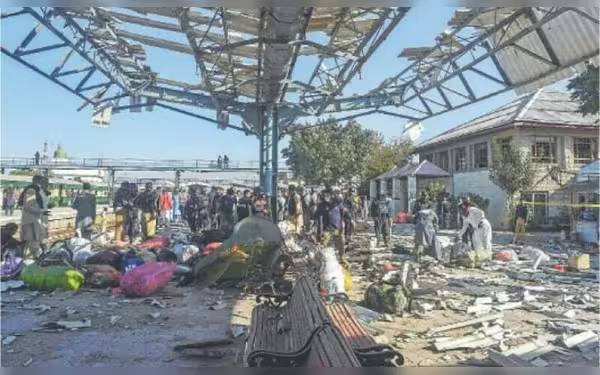Saturday, November 16, 2024 05:29 PM
Quetta Railway Station Suicide Bombing Condemned by World Leaders
- Suicide bombing in Quetta shocks Pakistan and the world.
- Global leaders express solidarity and condemn the attack.
- Urgent need for international cooperation against terrorism.
 Image Credits: dawn
Image Credits: dawnWorld leaders condemn the tragic suicide bombing at Quetta railway station, expressing solidarity with Pakistan and emphasizing the fight against terrorism.
On a tragic day in Quetta, Pakistan, a suicide bombing at the railway station has left the nation and the world in shock. This devastating attack, which resulted in the loss of innocent lives, including women and children, has drawn widespread condemnation from global leaders and local authorities alike. The incident highlights the ongoing struggle against terrorism that Pakistan faces, and the urgent need for international cooperation in combating such heinous acts.
World leaders have expressed their condolences and solidarity with Pakistan in the wake of this tragedy. Russian President Vladimir Putin conveyed his deep sorrow in a letter to President Asif Ali Zardari and Prime Minister Shehbaz Sharif. He described the bombing as a "barbaric crime" and emphasized Russia's commitment to working closely with Pakistan to fight terrorism. Putin stated, "We are determined to continue close cooperation with our Pakistani partners against all forms and manifestations of terrorism." This sentiment was echoed by the US mission to Pakistan, which assured the country of its support in preventing future acts of violence.
Malaysian Prime Minister Anwar Ibrahim also extended heartfelt condolences, expressing solidarity with the people of Pakistan. He remarked, "On behalf of Malaysia, I extend our deepest condolences to the people of Pakistan, who mourn this senseless and devastating loss." Similarly, the Turkish foreign minister condemned the attack and wished a speedy recovery to those injured, reiterating Turkey's support for Pakistan in its fight against terrorism.
The British High Commissioner to Pakistan, Jane Marriott, described the bombing as "horrific" and expressed her sympathies to the victims' families. She reaffirmed the UK's commitment to standing with Pakistan against terrorism. UN Secretary-General Antonio Guterres also condemned the attack, calling for accountability for the perpetrators and sending condolences to the families affected.
Within Pakistan, political, military, and religious leaders have united in their condemnation of the attack. Chief of Army Staff Gen Asim Munir emphasized the military's commitment to eradicating terrorism, stating that this mission would be pursued with collective determination. Various provincial leaders, including Sindh Governor Kamran Tessori and Punjab Chief Minister Maryam Nawaz, offered their condolences and prayers for the injured.
In a broader context, this tragic event serves as a stark reminder of the persistent threat of terrorism that looms over many nations. It calls for a united front, not just within Pakistan but globally, to address the root causes of extremism and to ensure the safety of civilians. As the world watches, it is crucial for countries to come together, share intelligence, and support one another in the fight against terrorism. Only through collective action can we hope to prevent such senseless acts of violence in the future.













